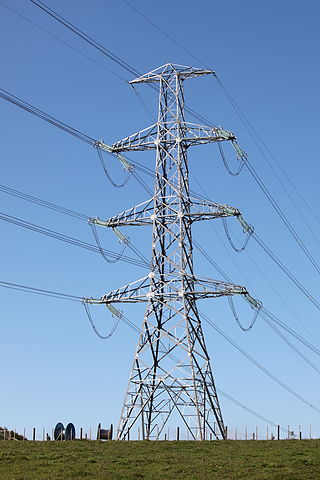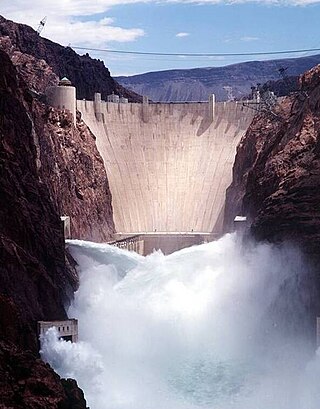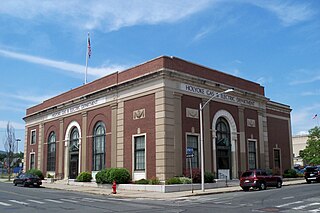
The Federal Energy Regulatory Commission (FERC) is the United States federal agency that regulates the transmission and wholesale sale of electricity and natural gas in interstate commerce and regulates the transportation of oil by pipeline in interstate commerce. FERC also reviews proposals to build interstate natural gas pipelines, natural gas storage projects, and liquefied natural gas (LNG) terminals, in addition to licensing non-federal hydropower projects.

A public utility company is an organization that maintains the infrastructure for a public service. Public utilities are subject to forms of public control and regulation ranging from local community-based groups to statewide government monopolies.

The electric power industry covers the generation, transmission, distribution and sale of electric power to the general public and industry. The commodity sold is actually energy, not power, e.g. consumers pay for kilowatt-hours, power multiplied by time, which is energy. The commercial distribution of electricity started in 1882 when electricity was produced for electric lighting. In the 1880s and 1890s, growing economic and safety concerns lead to the regulation of the industry. What was once an expensive novelty limited to the most densely populated areas, reliable and economical electric power has become an essential aspect for normal operation of all elements of developed economies.
Eversource Energy is a publicly traded, Fortune 500 energy company headquartered in Hartford, Connecticut, and Boston, Massachusetts, with several regulated subsidiaries offering retail electricity, natural gas service and water service to approximately 4 million customers in Connecticut, Massachusetts, and New Hampshire.

The Public Utility Regulatory Policies Act is a United States Act passed as part of the National Energy Act. It was meant to promote energy conservation and promote greater use of domestic energy and renewable energy. The law was created in response to the 1973 energy crisis, and one year in advance of a second energy crisis.
Silicon Valley Power (SVP) is a not-for-profit municipal electric utility owned and operated by the City of Santa Clara, California, USA. SVP provides electricity service to approximately 55,116 residential and business customers, including large corporations such as Intel, Applied Materials, Owens Corning and NVIDIA. SVP also owns and maintains a dark fiber network named SVP Fiber Enterprise.
The Florida Public Service Commission (FPSC) regulates investor-owned electric, natural gas, and water and wastewater utilities. The FPSC facilitates competitive markets in the telecommunications industry, has authority over intercarrier disputes, and oversees pay telephones, the federal Lifeline Assistance Program and Telecommunications Relay Service.

The Oregon Public Utility Commission (PUC) is the chief electric, gas and telephone utility regulatory agency of the government of the U.S. state of Oregon. It sets rates and establishes rules of operation for the state's investor-owned utility companies. With respect to publicly owned utility districts and cooperatives, its authority is limited to safety regulations.
Public water supply and sanitation in Germany is universal and of good quality. Some salient features of the sector compared to other developed countries are its very low per capita water use, the high share of advanced wastewater treatment and very low distribution losses. Responsibility for water supply and sanitation provision lies with municipalities, which are regulated by the states. Professional associations and utility associations play an important role in the sector. As in other EU countries, most of the standards applicable to the sector are set in Brussels. Recent developments include a trend to create commercial public utilities under private law and an effort to modernize the sector, including through more systematic benchmarking.

The American Gas Association (AGA) is an American trade organization founded in 1918 representing that represents and advocates on behalf of local energy companies that deliver natural gas throughout the United States.
The Energy Resources Conservation Board (ERCB) was an independent, quasi-judicial agency of the Government of Alberta. It regulated the safe, responsible, and efficient development of Alberta's energy resources: oil, natural gas, oil sands, coal, and pipelines. Led by eight Board members, the ERCB's team of engineers, geologists, technicians, economists, and other professionals served Albertans from thirteen locations across the province.

The American Public Power Association (APPA) is the service organization for approximately 2,000 U.S community-owned electric utilities that serve more than 49 million Americans.
The Indiana Utility Regulatory Commission (IURC) is the public utilities commission of the state of Indiana, led by five commissioners appointed by the governor.

Hydropower policy in the United States includes all the laws, rules, regulations, programs and agencies that govern the national hydroelectric industry. Federal policy concerning waterpower developed over considerable time before the advent of electricity, and at times, has changed considerably, as water uses, available scientific technologies and considerations developed to the present day; over this period the priority of different, pre-existing and competing uses for water, flowing water and its energy, as well as for the water itself and competing available sources of energy have changed. Increased population and commercial demands spurred this developmental growth and many of the changes since, and these affect the technology's use today.

The Commission for Regulation of Utilities, formerly known as the Commission for Energy Regulation, is the Republic of Ireland's energy and water economic utility regulator.

The Public Utilities Commission of Sri Lanka is the government entity responsible for policy formulation and regulation of the electric power distribution, water supply, petroleum resources, and other public utilities in Sri Lanka.

Bernard L. McNamee is a government official who served as Commissioner of the Federal Energy Regulatory Commission from 2018 to 2020. McNamee was confirmed by the United States Senate as a member of the Federal Energy Regulatory Commission on December 6, 2018. He previously served in various state and federal legal and policy positions and practiced energy law in the private sector.

Holyoke Gas & Electric (HG&E), formally known as the City of Holyoke Gas & Electric Department (HGED), is a municipal electric, gas, and telecommunications utility primarily serving Holyoke and Southampton, Massachusetts, one of two in Massachusetts which provide all three services. Founded in 1902 with the purchase of gas and electric plants from the Holyoke Water Power Company, the municipal corporation launched its first fiber optics communications services in 1997. On December 14, 2001 the City of Holyoke purchased the majority of the remaining assets and operations of the Holyoke Water Power Company from Northeast Utilities and as a result the municipal utility assumed control of the Holyoke Dam and Canal System and an electric distribution system serving industrial electric customers in the flats neighborhood. The utility discontinued district steam service to conserve energy used in aging infrastructure in September 2010. Using hydroelectric power generation in tandem with a series of solar panel facilities, the utility has among the lowest rates in the Commonwealth, and as of 2016 between 85% and 90% of the city's energy output was carbon neutral, with administrative goals in place to reach 100% in the next decade.











